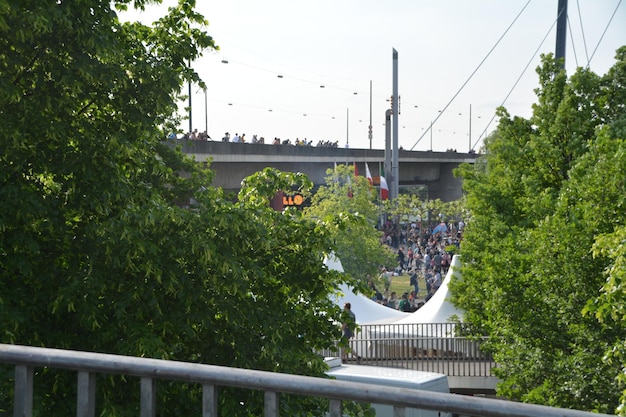Author Event Accessibility: Ensuring Inclusivity in 2025

Author event accessibility is crucial for ensuring inclusivity for all attendees in 2025, encompassing accommodations for various disabilities and creating a welcoming environment for everyone to engage with authors and literature.
Planning an author event? Ensuring author event accessibility is not just about compliance; it’s about creating a welcoming and inclusive environment for all attendees in 2025. Let’s explore how to make your event accessible for everyone.
Why Author Event Accessibility Matters
Author events are fantastic opportunities for readers to connect with their favorite authors. However, without proper accessibility planning, you may inadvertently exclude potential attendees. Prioritizing author event accessibility expands your reach and fosters a more inclusive literary community.
Ethical Considerations
Accessibility is more than a legal requirement; it’s an ethical imperative. Everyone deserves the chance to participate in cultural events. By focusing on author event accessibility, you demonstrate a commitment to equity and inclusivity.
Legal Requirements
The Americans with Disabilities Act (ADA) sets specific standards for accessibility in public accommodations, including event venues. Non-compliance can lead to legal repercussions. Ensuring author event accessibility means adhering to these regulations and providing necessary accommodations.
- Review ADA guidelines for event venues.
- Consult with accessibility experts to ensure compliance.
- Provide reasonable accommodations for attendees with disabilities.
Ignoring accessibility can result in negative publicity and damaged reputation. Attendees who feel excluded are likely to share their experiences, potentially harming your event’s future prospects. By focusing on author event accessibility, you create a positive impression and build a loyal audience.

Practical Steps to Enhance Accessibility
Enhancing accessibility involves careful planning and attention to detail. From choosing the right venue to providing necessary accommodations, several practical steps can make your author event more inclusive.
Venue Selection
The venue is a crucial factor in determining accessibility. Choose a location that is physically accessible and offers necessary amenities. For effective author event accessibility, ensure the venue has ramps, elevators, and accessible restrooms.
Communication and Promotion
Clearly communicate accessibility information during promotion. Include details about available accommodations on your website and promotional materials. For optimal author event accessibility, make it easy for attendees to request specific accommodations during registration.
- List accessibility features on your website.
- Provide contact information for accommodation requests.
- Use accessible language in promotional materials.
Staff training is essential for providing excellent support. Educate your team on how to assist attendees with disabilities and address their specific needs. Prioritizing author event accessibility can create a welcoming atmosphere for everyone.
Assistive Technologies and Services
Incorporating assistive technologies and services can significantly enhance accessibility. These tools help attendees with disabilities fully participate in the event.
Real-Time Captioning
Real-time captioning, also known as CART (Communication Access Realtime Translation), provides immediate text transcripts of spoken content. Using real-time captioning for author event accessibility ensures that deaf and hard-of-hearing attendees can follow presentations and discussions.
Assistive Listening Devices
Assistive listening devices (ALDs) amplify sound for individuals with hearing loss. Providing ALDs for author event accessibility ensures that attendees can hear clearly, regardless of background noise. These devices can be particularly helpful in large or noisy venues.

Engaging Diverse Audiences
Creating an inclusive author event means understanding and addressing the needs of diverse audiences. Tailoring your event to accommodate different disabilities can significantly enhance engagement.
Visual Impairments
For attendees with visual impairments, consider providing materials in alternative formats, such as Braille or large print. Offer audio descriptions of visual elements. Prioritizing author event accessibility in this way ensures that everyone can participate fully.
Mobility Challenges
Ensure that the venue layout accommodates wheelchairs and other mobility devices. Provide ample space for maneuvering and seating options for attendees with mobility challenges. Planning for author event accessibility means considering the needs of all attendees.
- Offer wheelchair-accessible seating.
- Provide ramps or elevators for access to different levels.
- Ensure clear pathways and signage.
Consider incorporating sensory-friendly elements to create a more comfortable environment for attendees with sensory sensitivities. This might include reducing harsh lighting and providing quiet spaces for individuals to retreat to if needed. When focusing on author event accessibility, small adaptations can make a big difference.
Funding and Resources for Accessibility
Implementing accessibility measures may require financial investment. Explore funding opportunities and resources available to support your efforts.
Grants and Sponsorships
Several organizations offer grants and sponsorships to support accessibility initiatives. Research funding opportunities in your area and apply for grants to offset the costs of implementing accessibility measures. By securing funding for author event accessibility, you can expand your reach and impact.
Community Partnerships
Partner with local disability organizations to access expertise and resources. These organizations can provide valuable insights and support in creating an accessible event. Collaboration focused on author event accessibility can lead to more inclusive outcomes.
- Consult with disability organizations for guidance
- Seek advice on implementing accessibility measures
- Collaborate to promote your event to diverse audiences
Don’t overlook volunteer support. Recruit volunteers to assist attendees with disabilities during the event. Volunteers can provide assistance with navigation, seating, and other needs, enhancing the overall experience when improving author event accessibility.
Measuring and Improving Accessibility
Accessibility is an ongoing process. Regularly assess your efforts and make improvements based on feedback from attendees. Prioritizing continuous improvement of author event accessibility ensures that your event becomes more inclusive over time.
Gather Feedback
Solicit feedback from attendees with disabilities after the event. Ask about their experiences and suggestions for improvement. Anonymous surveys are a useful way to gather candid feedback.
Conduct Accessibility Audits
Regularly conduct accessibility audits to identify areas for improvement. Engage accessibility experts to assess your venue and event practices. Using audits for author event accessibility can help you maintain compliance and identify new opportunities for inclusivity.
| Key Aspect | Brief Description |
|---|---|
| ♿ Venue Accessibility | Ensure ramps, elevators, and accessible restrooms are available. |
| 🗣️ Communication Clarity | Provide clear information on accessibility during promotion. |
| 🎧 Assistive Technologies | Incorporate real-time captioning and assistive listening devices. |
| 🤝 Community Partnerships | Collaborate with disability organizations for expertise and support. |
Frequently Asked Questions About Author Event Accessibility
▼
The Americans with Disabilities Act (ADA) sets the standards. It requires public accommodations, including event venues, to be accessible to individuals with disabilities. Compliance involves providing ramps, accessible restrooms, and other necessary accommodations.
▼
Ensure that there are ramps or elevators to access all levels of the venue. Provide ample space for maneuvering wheelchairs, and make sure seating arrangements include wheelchair-accessible options. Clear pathways are also important for easy navigation.
▼
Real-time captioning (CART) is crucial for deaf and hard-of-hearing attendees. Assistive listening devices (ALDs) amplify sound for individuals with hearing loss. If using visual presentations, provide audio descriptions to help blind or visually impaired individuals.
▼
Include detailed accessibility information on your website, promotional materials, and registration forms. Provide a contact person or email address for attendees to request specific accommodations. Use clear and accessible language to convey the information effectively.
▼
Distribute feedback surveys after the event, asking attendees about their experiences and suggestions for improvement. Offer an anonymous channel for providing feedback. Consider conducting accessibility audits to identify areas that need attention.
Conclusion
Prioritizing author event accessibility is not only a legal and ethical responsibility but also a pathway to creating a more inclusive and welcoming literary community. By taking practical steps to enhance accessibility, incorporating assistive technologies, and engaging diverse audiences, you can ensure that everyone has the opportunity to participate fully in your event. Regularly measuring and improving accessibility will lead to continuous progress and a more enriching experience for all attendees.





